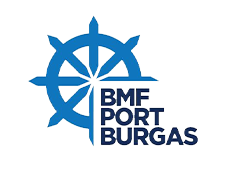BMF PORT BURGAS: Gateway to a Stronger Black Sea
With new investments, new shipping services, and record growth, BMF Port Burgas is quickly establishing itself as a critical gateway for European trade in the Black Sea. CEO Boris Balev tells Energy Focus why versatility, ambition, and a hardworking team are helping Bulgaria’s port sector punch above its weight.
For decades, the Black Sea has been Europe’s overlooked frontier — an area ripe with potential but hamstrung by underdeveloped logistics infrastructure. In a region where strategic connectivity is critical yet often unreliable, ports have been left playing catch-up to rising trade flows. Now, Bulgaria’s BMF Port Burgas is changing the story. Driven by major investment, growing volumes, and an expert team, BMF Port Burgas is establishing itself as a vital bridge between East and West — and a cornerstone for a more resilient European supply chain.
BUILDING CAPACITY
Situated at the heart of Burgas Bay, BMF Port Burgas operates Port Terminal Burgas East II and Port Terminal Burgas West, two dynamic facilities rapidly growing in importance. Both terminals benefit from natural deep-water access, excellent rail and road connectivity, and a flexible, multi-cargo approach that sets them apart in a market traditionally built around single-commodity specialisation.
“Bulgaria is a small country — around 6.5 million people. There is a variety of industry here, and it’s not like elsewhere where there are special terminals or companies that handle one or two cargoes,” explains Boris Balev, CEO at BMF Port Burgas. “We handle almost everything. Containers, liquid cargo, grain cargo, general cargo, and Ro-Ro cargo — we offer all, and we have equipment to handle a variety of cargo.”
This versatility is proving critical as shippers seek new options across the Black Sea. Major investments in infrastructure have allowed the port to keep pace with demand. In 2012, the port handled 1.3 million tonnes; by 2024, volumes had reached an impressive 7.6 million tonnes.
BMF Port Burgas recently delivered one of its most significant infrastructure upgrades with the opening of a new deep-water berth at Port Terminal Burgas West. Berth No. 28, with a depth of -15.5 meters alongside, can accommodate the largest container ships able to transit the Bosporus Strait. It positions BMF Port Burgas as a compelling alternative to Constanța and offers container lines a highly competitive option for their Black Sea services.
“That gives us really promising possibilities as the first deep seaport after Bosporus but before Constanța,” says Balev. “We offer the container lines a good option to organise their cargo.”
INFRASTRUCTURE IN ACTION
Far from standing still, BMF Port Burgas has plans for further expansion. New grant agreements under the CEF Transport programme have been signed, with co-funding secured for the ‘From East to West Connections’ project (FE2WC). This initiative will support infrastructure enhancements across both terminals, modernising handling facilities and improving the port’s intermodal capabilities.
“We have plans for the future — we would like to build another two or three berths, but that depends on the clients,” Balev explains. “At the end of this year or the beginning of next year, we will start to formalise those plans. We are waiting for the Port Authority to take the decision on dredging, and when that happens, we will act quickly.”
The port’s proven track record of timely and efficient project delivery has attracted new shipping lines too. Recently, BMF Port Burgas was added to MEDKON Lines’ BRO service and linked into a new Middle Corridor route connecting Asia and Europe. These developments enhance the port’s role as a vital transshipment hub — one that brings flexibility and speed to global supply chains at a time when resilience is more important than ever.
“Project cargo is another area where we have seen rising demand,” says Balev. “We are happy to satisfy special needs for specific types of cargo. We don’t fear investing to ensure we can support our customers effectively.”
DRIVING PARTNERSHIPS
One of the reasons BMF Port Burgas can adapt quickly to evolving market needs is its collaborative approach with suppliers and customers alike. Whether sourcing specialized cranes from international manufacturers or working with local partners, the port’s team prioritises quality, economic viability, and long-term value.
“We have a very strong team, and they are excellent at identifying opportunities,” Balev says. “Our decisions are always made for the port, and that is why people respect our choices.”
This attitude extends to longstanding relationships with key industrial players. Among its major customers is Aurubis, part of the German Aurubis Group, a major European industrial player.
“Our relationship with Aurubis is very strong,” says Balev. “Through us, they import copper concentrate and then export copper cathodes, as well as sulphuric acid as a secondary product.”
It’s not just about size or scale — it’s about service quality, too. Balev emphasises the professional expertise and commitment of the port’s team as a central pillar of BMF Port Burgas’ success.
“Our team does a fantastic job,” he says proudly. “They are hardworking, they are dedicated, and they are making great things happen for Bulgaria.”
A STRATEGIC FUTURE
The broader geopolitical context adds further weight to the port’s ambitions. As tensions persist in Eastern Europe, the Black Sea remains a critical — and volatile — junction for energy, raw materials, and manufactured goods. Reliable infrastructure here is not just important; it’s essential.
By investing in modernisation, building new connections, and expanding capacity, BMF Port Burgas is creating a new gateway that strengthens Bulgaria’s role in European and global trade networks.
“We have the location, we have the facilities, and we have the expertise,” says Balev. “Our goal is to keep growing, to keep offering value to our customers, and to make Port Burgas a key part of Europe’s logistics future.”
With its deep-water capabilities, versatile handling facilities, and a clear vision for growth, BMF Port Burgas is rapidly cementing itself as one of the Black Sea’s most important logistics assets. In doing so, it’s helping to create new opportunities for Bulgarian industry, enhance Europe’s supply chain resilience, and deliver a much-needed boost to regional connectivity at a critical time.


